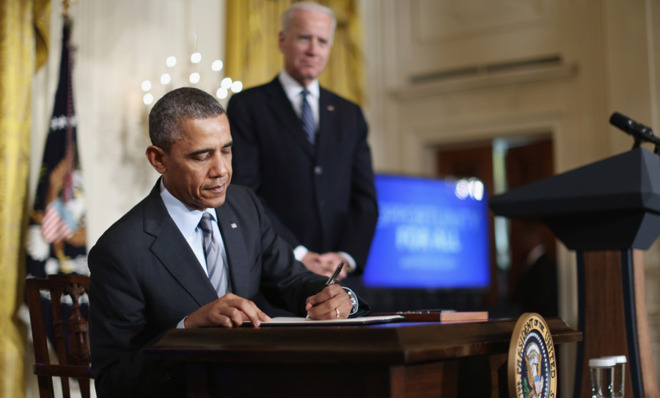There's no shame in Obama being a 'Clintonian' president
Many Americans think of the president as all-powerful. Many Americans are wrong.


A free daily email with the biggest news stories of the day – and the best features from TheWeek.com
You are now subscribed
Your newsletter sign-up was successful
A new president almost always takes office full of energy and ambition, deploying sweeping rhetoric as he lays out a transformative agenda. He gets some significant things done. But then the contraction begins. Plans fail to go anywhere, legislation stalls, policies proposed by the White House become smaller and then downright miniscule.
Soon the opposition gloats about his newly diminutive presidency, while the analysts sort through the recent past looking for signs of missteps. How could our Great American Hope have managed to become such a monumental disappointment? Oh well, on to the next campaign and the quest for a new political savior...
Maybe someday we'll learn our lesson and break the cycle. But that would require coming to terms with the reality of presidential power — and its permanent limits, at least in domestic policy.
The Week
Escape your echo chamber. Get the facts behind the news, plus analysis from multiple perspectives.

Sign up for The Week's Free Newsletters
From our morning news briefing to a weekly Good News Newsletter, get the best of The Week delivered directly to your inbox.
From our morning news briefing to a weekly Good News Newsletter, get the best of The Week delivered directly to your inbox.
In foreign policy, presidents enjoy enormous power — which may be part of the reason we perennially overestimate a president's capacity to control the political world at home. In addition to the constitutionally declared power to wage war as commander in chief, presidents over the last several decades have claimed (without much resistance from Congress or voters) the authority to launch wars without formal congressional approval, as well as to spy, torture, and assassinate a range of "enemies" (including a select few who happen to be American citizens). That can make presidents seem very, very powerful.
But in the domestic sphere, presidential powers are much more modest. Presidents can impose (or rescind) rules and regulations across numerous executive branch departments. They can try to get legislation introduced in Congress (though it may well go nowhere). They can issue executive orders in some areas (though these can just as easily be reversed by any subsequent president). And they can deliver speeches and hold news conferences.
And that's about it.
The exceptions come during moments of unified government, when the president and both houses of Congress come from the same party. When that happens, presidents can sometimes appear to be more powerful than they really are — think of George W. Bush signing Medicare Part D while waging two wars at once, or Barack Obama overseeing the passage of the economic stimulus package along with ObamaCare during his first two years in office.
A free daily email with the biggest news stories of the day – and the best features from TheWeek.com
Of course, not even unified government can guarantee that a president's legislative priorities will be enacted. Just ask W. about his foiled plans to privatize Social Security, or the Clintons about their failed efforts to pass health-care reform.
Which brings us to the tendency of commentators to describe the modesty of Obama's current agenda as "Clintonian," while insinuating that this is something the president should be ashamed of. The only reason it should embarrass him is that he used to mock Clinton's latter-day small-ball approach to governing. But that was, like so much surrounding Obama's 2008 campaign, an expression of naïve overconfidence about how much "change" the new president would be able to effect.
A Clintonian president is a realistic president. It might be a very good thing if all of us — very much including the person who prevails at the polls in 2016 — got used to the idea and adjusted our expectations to fit the realities of presidential power.
Damon Linker is a senior correspondent at TheWeek.com. He is also a former contributing editor at The New Republic and the author of The Theocons and The Religious Test.
